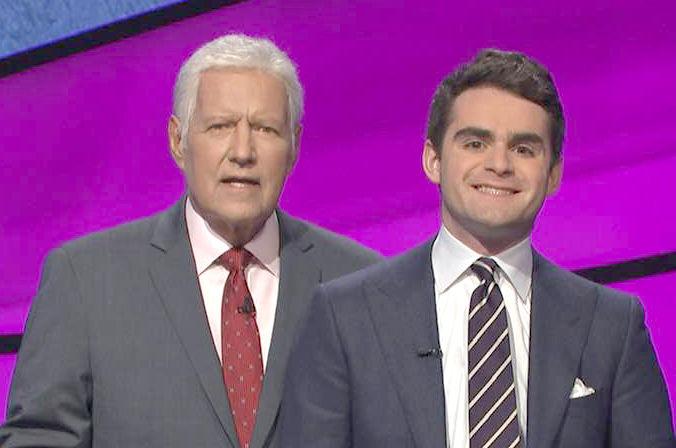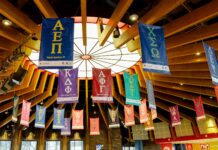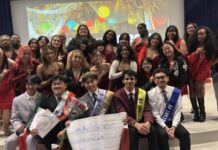PARK RIDGE, Illinois — With the country sheltering in place for who knows how long, Adam Smith is pretty sure he won’t get his special trip with friends after taking the bar exam in July.
Instead, the 2016 University of Illinois graduate and Phi Kappa Psi will take the several thousand dollars he won on “Jeopardy” in January and probably apply most of it to $300,000 worth of debt he’s racked up at Harvard Law School.
The first episode of the popular quiz show that Smith taped aired Wednesday. He’s not able to talk about the ones that haven’t aired yet — which reveals that he has at least one win under his belt.
“This was the greatest daylong heart attack I’ve ever had,” said the 25-year-old.
After double majoring in communication and political science at the UI, Smith said he wasn’t worried about appearing on television. He is comfortable with public speaking and speech-writing and was on his high school quiz bowl team at Maine South in Park Ridge.
Smith was in the first class of Lincoln Scholars at the UI in 2012. The initiative “for promising incoming Liberal Arts and Sciences students whose financial situation might prevent them from enrolling at Illinois,” netted Smith a four-year full-tuition scholarship.
He wrote political columns for The Daily Illini, coordinated with the Illini Democrats to bring Bernie Sanders to campus and interned with Sen. Dick Durbin while also being in the Phi Kappa Psi fraternity on Fourth Street in Champaign. He also found time for the Illini Inn across the street. “I am a Mug Club member.”
Law school was part of his plans all along and Smith is on track to graduate from Harvard in May. He’s currently at the Park Ridge home of his parents, Marc Smith and Mary Nicolau, both UI grads, interacting with classmates and law professors via Zoom on his laptop.
He has already accepted a law clerk position with U.S. Senior District Court Judge William Bauer, who serves on the 7th Circuit Court of Appeals in Chicago.
Buzzer beater
A lifelong self-described “Jeopardy” nerd who watched it after school at 3:30 p.m. on ABC Channel 7 in Chicago, Smith tested for “Teen Jeopardy” in high school and again as a freshman in college. Both times, he made it to auditions but not on the show.
“I think I wore yellow pants that may have blinded them,” he said of his preppy dress phase in college.
He again took the test in January 2019 and learned in July that he would audition in August.
“Luckily, I had just finished summer employment so I got to watch old episodes. It helped me with timing, getting the rhythm of the show down,” he said.
Just before Christmas, he was informed he would appear — only about 3.5 percent who test do — and received “Jeopardy” and trivia books as gifts.
“One was a guide from a former ‘Tournament of Champions’ winner on how to win with the buzzer,” he said, adding that motivated him to spend $90 on a quiz-bowl buzzer to plug in to his computer for use with an app.
“Most folks will practice with a ballpoint pen as a clicker. That’s how I did it for a while, then I thought it was worth the investment to step up my training,” he said.
He reached out to fellow UI grad James Holzhauer, who won in excess of $2.4 million in 33 appearances in 2019, via email for tips but never heard back. He did employ Holzhauer’s training method of reading children’s geography books for a brain boost.
Lights, camera …
The first taping was on Jan. 28. He flew to Los Angeles at his own expense. His parents and sister also went. The show tapes two days a week, 10 episodes a day, he said.
“They wake you up on the day you are taping, 7:15 a.m. call time,” he said. “They pick you up and you ride with all the other contestants to Sony Pictures in Culver City. You do a meet-and-greet with the producers. We sign a bunch of forms, talk among ourselves, and they start us with a couple practice games to be comfortable with the stage and buzzer.
“That’s when it starts to feel really real. The stage is just as big as it looks on TV. It’s about 30 feet from our podiums to where Alex is standing,” he said of host Alex Trebek, whom he described as “immensely charming” and a “professional.”
With names drawn from a hat, Smith was chosen for the third show of the day.
As taping time neared, he chugged a bottle of water and felt the adrenaline course through him.
“You hear the countdown, the studio goes black, you hear all the music and the sound effects. You are living a game you have watched on TV,” he said. “I came close to blacking out. Somehow, I stayed sentient and awake.”
‘In a daze’
Smith said he filled out a questionnaire that asked for anecdotes about himself from which Trebek chose one of three to use in the introductions.
When Trebek asked about what Smith might do with winnings and said something like, “I hear you are a street-food connoisseur,” Smith knew he was talking about a plan he and his younger brother have had to open a hot dog stand.
“We are Chicago walking stereotypes through and through,” Smith said.
He called his first round “miserable” but said he rebounded in the second round, crediting his buzzer training. When it came time for “Final Jeopardy,” Smith said he heard the words “alliterative legislation” and suppressed his outward joy, figuring there were likely only three answers and he knew them all.
“I bet everything I had,” Smith said, adding he knew that House resolution 1776 — “signed into law in March 1941, which provided aid to a foe from 1776” — was the Lend Lease Act.
That response, coupled with his bet, made him the winner.
“I was in a daze for the next half-hour. They call you ‘Champ,’” he said.
The time in the studio went very quickly.
“It’s like a lot of big things in your life. It just sort of flies by and you only get to appreciate it in retrospect,” he said.
Smith said one of the fun consequences of his experience was to be invited into a “secret Facebook group for former contestants.”
“They are the nicest people who are doing mutual-aid stuff for COVID-19, trivia for charity,” he said. “It’s a really, really nice group of people. I’m really glad to be added to their ranks.”






















